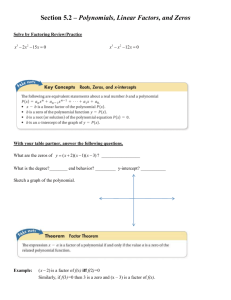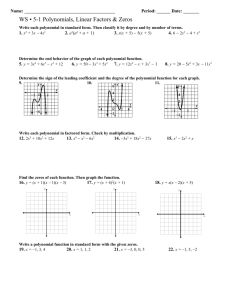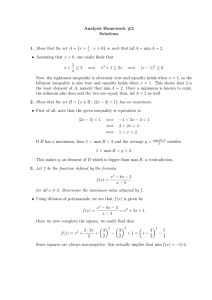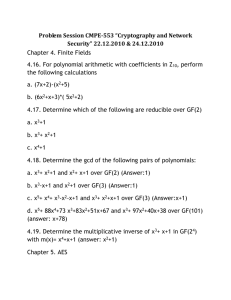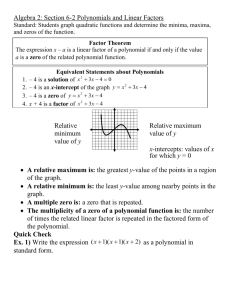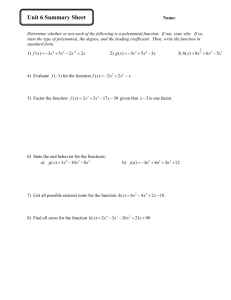Document 10812996
advertisement
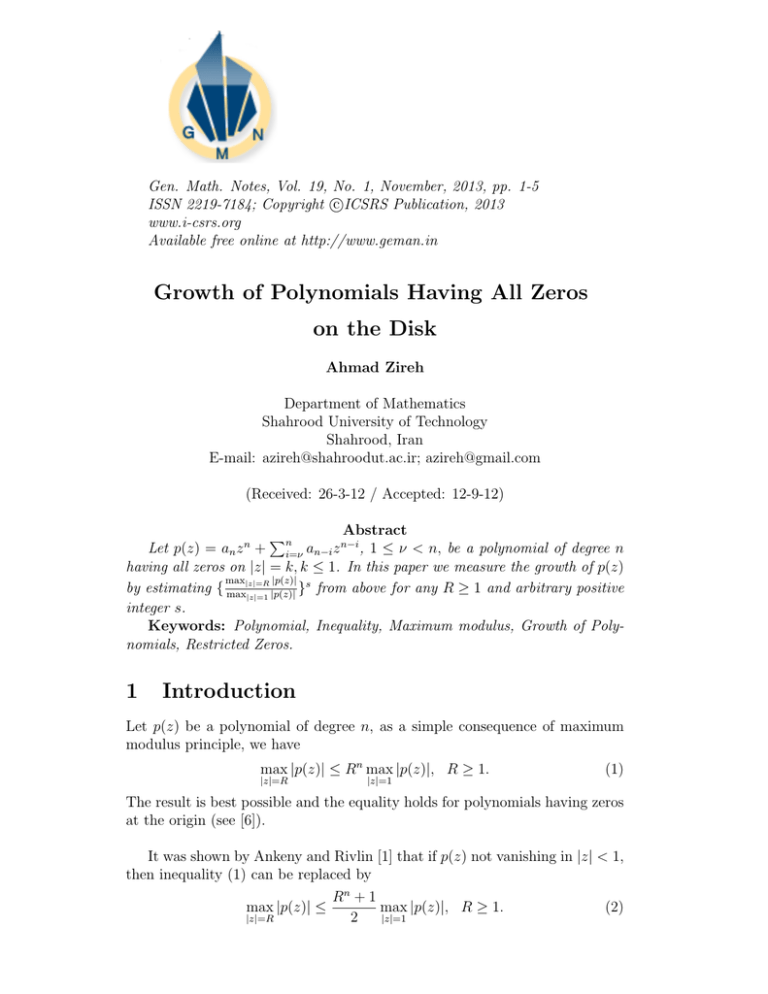
Gen. Math. Notes, Vol. 19, No. 1, November, 2013, pp. 1-5
c
ISSN 2219-7184; Copyright ICSRS
Publication, 2013
www.i-csrs.org
Available free online at http://www.geman.in
Growth of Polynomials Having All Zeros
on the Disk
Ahmad Zireh
Department of Mathematics
Shahrood University of Technology
Shahrood, Iran
E-mail: azireh@shahroodut.ac.ir; azireh@gmail.com
(Received: 26-3-12 / Accepted: 12-9-12)
Abstract
Let p(z) = an z + i=ν an−i z , 1 ≤ ν < n, be a polynomial of degree n
having all zeros on |z| = k, k ≤ 1. In this paper we measure the growth of p(z)
max
|p(z)| s
} from above for any R ≥ 1 and arbitrary positive
by estimating { max|z|=R
|z|=1 |p(z)|
integer s.
Keywords: Polynomial, Inequality, Maximum modulus, Growth of Polynomials, Restricted Zeros.
n
1
Pn
n−i
Introduction
Let p(z) be a polynomial of degree n, as a simple consequence of maximum
modulus principle, we have
max |p(z)| ≤ Rn max |p(z)|, R ≥ 1.
|z|=R
|z|=1
(1)
The result is best possible and the equality holds for polynomials having zeros
at the origin (see [6]).
It was shown by Ankeny and Rivlin [1] that if p(z) not vanishing in |z| < 1,
then inequality (1) can be replaced by
Rn + 1
max |p(z)|, R ≥ 1.
(2)
max |p(z)| ≤
|z|=1
|z|=R
2
2
Ahmad Zireh
Inequality (2) is sharp and the equality holds for p(z) = α + γz n , where
|α| = |γ|.
P
Recently Dewan and Ahuja [4] proved that if p(z) = ni=0 ai z i is a polynomial
of degree n having all zeros on |z| = k, k ≤ 1, then for every positive integer s
{ max |p(z)|}s ≤
|z|=R≥1
1 n|an |(k n (1 + k 2 ) + k 2 (Rns − 1)) + |an−1 |(2k n + Rns − 1)
kn
2|an−1 | + n|an |(1 + k 2 )
{max |p(z)|}s .
|z|=1
(3)
P
In this paper, we consider a class of polynomials p(z) = an z n + ni=ν an−i z n−i ,
1 ≤ ν < n, and generalize inequality (3) by proving the following result.
P
Theorem 1.1. If p(z) = an z n + ni=ν an−i z n−i , 1 ≤ ν < n, is a polynomial
of degree n having all zeros on |z| = k, k ≤ 1, then for every positive integer s
{ max |p(z)|}s ≤
|z|=R≥1
1
k n−ν+1
×
n|an |(k n (1 + k ν+1 ) + k 2ν (Rns − 1)) + ν|an−ν |(k n + k n−ν+1 + k ν−1 (Rns − 1))
ν|an−ν |(1 + k ν−1 ) + n|an |(k ν−1 + k 2ν )
× {max |p(z)|}s .
|z|=1
(4)
If we take ν = 1, then inequality (4) reduce to inequality (3).
We illustrate by means of following example that the bound obtained by inequality (4) is better than the bound obtained by inequality (3).
1 2
1 2
z + ( 100
) and k = 1/10, R = 1.5 and
Example 1.2. Let p(z) = z 4 − 50
s = 2. Then by inequality (3) we have
{max |p(z)|}s ≤ 2439.505569{max |p(z)|}s ,
|z|=R
|z|=1
while by inequality (4) we get
{max |p(z)|}s ≤ 244.850556{max |p(z)|}s .
|z|=R
|z|=1
If we take s = 1, in Theorem 1.1, we have the following result
Corollary 1.3. If p(z) = an z n +
Pn
i=ν
an−i z n−i , 1 ≤ ν < n, is a polynomial
3
Growth of Polynomials Having All Zeros...
of degree n having all zeros on |z| = k, k ≤ 1, then
max |p(z)| ≤
|z|=R≥1
1
k n−ν+1
×
n|an |(k n (1 + k ν+1 ) + k 2ν (Rn − 1)) + ν|an−ν |(k n + k n−ν+1 + k ν−1 (Rn − 1))
ν|an−ν |(1 + k ν−1 ) + n|an |(k ν−1 + k 2ν )
× max |p(z)|.
|z|=1
(5)
If we take k = 1, in inequality (5), we get the following result
P
Corollary 1.4. If p(z) = an z n + ni=ν an−i z n−i , 1 ≤ ν < n, is a polynomial
of degree n having all zeros on |z| = 1, then
max |p(z)| ≤
|z|=R≥1
2
Rn + 1
max |p(z)|.
|z|=1
2
(6)
Lemmas
For proof of the theorem, we need the following lemma which is due to Dewan
and Sunil Hans [5].
P
Lemma 2.1. If p(z) = an z n + ni=ν an−i z n−i , 1 ≤ ν < n, is a polynomial
of degree n having all zeros on |z| = k, k ≤ 1, then
max |p0 (z)| ≤
|z|=1
3
n
k
(
n−ν+1
n|an |k 2ν + ν|an−ν |k ν−1
) max |p(z)|.
ν|an−ν |(1 + k ν−1 ) + n|an |k ν−1 (1 + k ν+1 ) |z|=1
(7)
Proof of the Theorem
Proof of the Theorem 1.1. Note that for every θ, 0 ≤ θ < 2π and R ≥ 1,
we have
Z R
d
iθ s
iθ s
{p(Re )} − {p(e )} =
{p(teiθ )}s dt
dt
1
Z R
s−1
=
sp(teiθ ) p0 (teiθ )eiθ dt .
1
Then
iθ
s
iθ
s
Z
|{p(Re )} − {p(e )} | ≤ s
1
R
|p(teiθ )|s−1 |p0 (teiθ )|dt .
(8)
4
Ahmad Zireh
Since p(z) is of degree n, the polynomial p0 (z) is of degree n−1, hence applying
inequality (1) to p0 (z) and p(z), we have for t ≥ 1 and 0 ≤ θ < 2π
|p0 (teiθ )| ≤ tn−1 max |p0 (z)|,
|z|=1
iθ
(9)
n
|p(te )| ≤ t max |p(z)|.
|z|=1
Combining (8) and (9) we have
iθ s
iθ s
0
|p(Re ) − p(e ) | ≤ s max |p (z){| max |p(z)|}
|z|=1
s−1
|z|=1
Z
R
tns−1 dt .
(10)
1
On applying Lemma 2.1 to the above inequality, we get
n|an |k 2ν + ν|an−ν |k ν−1
)
k
ν|an−ν |(1 + k ν−1 ) + n|an |k ν−1 (1 + k ν+1 )
Z R
s
{max |p(z)|}
tns−1 dt.
|{p(Reiθ )}s − {p(eiθ )}s | ≤
ns
(
n−ν+1
|z|=1
1
This gives
Rns − 1
n|an |k 2ν + ν|an−ν |k ν−1
(
)×
k n−ν+1 ν|an−ν |(1 + k ν−1 ) + n|an |k ν−1 (1 + k ν+1 )
{max |p(z)|}s .
|p(Reiθ )|s − |p(eiθ )|s ≤
|z|=1
Equivalently
Rns − 1
n|an |k 2ν + ν|an−ν |k ν−1
(
){max |p(z)|}s
k n−ν+1 ν|an−ν |(1 + k ν−1 ) + n|an |k ν−1 (1 + k ν+1 ) |z|=1
Rns − 1
n|an |k 2ν + ν|an−ν |k ν−1
≤ {max |p(z)|}s + n−ν+1 (
){max |p(z)|}s .
ν−1
ν−1
ν+1
|z|=1
k
ν|an−ν |(1 + k ) + n|an |k (1 + k ) |z|=1
|p(Reiθ )|s ≤ |p(eiθ )|s +
From which proof of inequality(4) follows.
Acknowledgements: The author is grateful to the referees, for the helpful
suggestions and comments.
References
[1] N.C. Ankeny and T.J. Rivlin, On a theorem of S. Bernstein, Pacific J.
Math., 5(1955), 849-852.
[2] A. Aziz, Growth of polynomials whose weros are within or outside a circle,
Bull. Austral. Math. Soc., 35(1987), 247-256.
Growth of Polynomials Having All Zeros...
5
[3] A. Aziz and Q.M. Dawood, Inequalities for a polynomial and its derivative,
J. Approx. Theory, 54(1988), 306-313.
[4] K.K. Dewan and A. Ahuja, Growth of polynomials with prescribed zeros,
J. Math. Ineq., 5(3) (2011), 355-361.
[5] K.K. Dewan and S. Hans, On maximum modulus for the derivative of
a polynomial, Annales Universitatis Mariae Curie-Sklodowska LublinPolonia, LXIII(2009), 55-62.
[6] Q.I. Rahman and G. Schmeisser, Analytic Theory of Polynomials, Oxford
University Press, New York, (2002).

